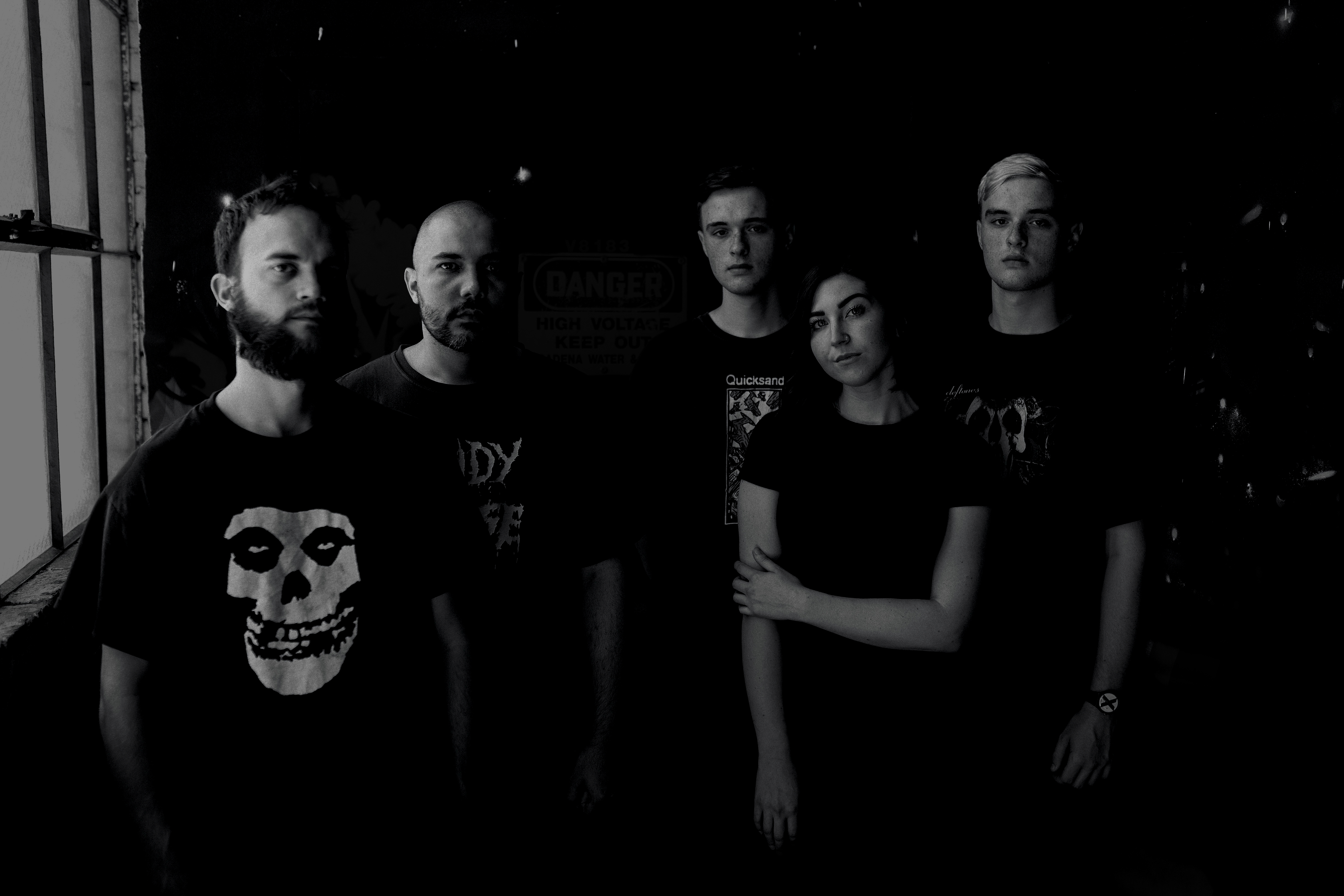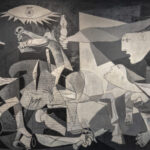Interview: Year of the Knife Discuss Their Aggressive Debut LP “Internal Incarceration”
Posted: by The Alt Editing Staff
Year of the Knife have very quickly made a name for themselves within the hardcore community. With their vulnerable lyricism, heavy guitar tones and overall aggression, the band has carved out a unique sound. The band amplified this further on their debut LP Internal Incarceration, covering themes of sadness, addiction and loss. Sarah got to talk to lead singer, Tyler Mullen, and bassist, Madison Watkins about the record and their style of hardcore.

Photo Credit: Kat Nijmeddin
Sarah: So first off, I love the album so much. It’s really something special. So I would love to get into how the album was conceived coming off of the last 2 EP’s that you put out?
Tyler: From the first EP, we started with 3 songs then another 5 songs with the next release and then we gradually did more and more. I feel like that’s pretty good for a band. I feel like any band should be working themselves up to a full length. I guess I just found some discipline in writing music. We just learned from being consistent, we were practicing roughly 3 days a week and writing new songs almost once a week.
Madison: We also had a lot more time and there was a lot more leading up to the LP than we did with the EP’s. Like Tyler was saying, it gave us so much more time and material to work on what we had. We have now, 13 songs on the record but before that we had a lot more that were chopped up in different ways. I think though, with touring, and the last year before things got shut down, we were touring more than any of us ever had. So being on the road we were being more disciplined about writing. I think that pushed us and pushed the record.
I know you touched on writing a little bit already, but in some previous interviews you discussed how writing in YOTK is very collaborative, did that change on this LP? How did you develop your sound further?
Tyler: I think it changed a little bit. We had written a lot of songs, and then eventually we sharpened things up. Brandon and I would write and so would Madison. Half-way through this album all new songs started to come from the rest of the band, and I would just add on vocals. It’s kind of cool to see two different dynamics; Brandon and I and then Brandon and the rest of the band.
Madison: Brandon would usually kick it off. He would just send things to our group chat and then we would bounce off ideas at practice. Sometimes it’d be a single riff or more of a full-fledged song and we would work with it from there. It was definitely interesting having Tyler playing drums and then transitioning into vocals. I think it’s so cool that you [Tyler] still bring ideas to the table and have the ability to play drums and add things in.
So as far as going into the recording studio, I know you worked with Kurt Ballou who is extremely influential amongst the hardcore community and has put out so many amazing records. What was recording with him like and what do you think he added?
Tyler: He pushed us a lot and called us out on our shit. He would just say “hey, that sucked” or “you sound like this when you want to sound like this.” That and he added an atmosphere to this record that was so much darker and hellish. He wanted to work with us and once we started to work with him I think he sees something in a band and adapts the sound to it. You become yourself but you evolve too.
Madison: It was definitely intimidating working with him too because he’s worked with Converge and some other great bands. Recording is already daunting to begin with so recording with someone you look up to as a musician and producer was intimidating at first, but he immediately broke that down. He just pushed us to our very best and do more takes if we needed to. Sometimes you think “oh, I can do that better” but the producer says its good, but Kurt will say “if you think you can do it better do it again” or “I’ve heard you play this better, do it again.” He pushed us as far as our performance on the record and also the sound, workshopping it. He spent I think a day with all of us just workshopping our tone down, giving us suggestions for pedals and stuff. It was great working with him because he just has an ear for heavy music which took what we brought in and took it to the next level.
I feel like I can sense that atmosphere, the album feels more like a standalone piece rather than a collection of songs.
Tyler: That’s good to hear. Even on the record sometimes we feel like “oh no it all blends together” but it’s not out yet, and nobody’s heard it so it’s great to hear that.
Thanks. Well it seems with your style of hardcore that it’s not only physically demanding, given the fast-paced nature of the instruments and vocally, but also emotionally demanding. Do you do anything to help yourself prepare to get into the zone?
Tyler: I listen to a lot of albums. I think I can access these things naturally. I’m a pretty emotional person. I can get angry pretty quickly. As far as the music aspect, when it’s your life, when you put all of your pain, all of your emotion into it, that’s what it’s there for. I get hyped up obviously, listening to something that’s angry and emotional like Slipknot or All Else Failed, things that I really connect with.
Madison: I have two different moods as far as playing live and recording. With recording, I feel a lot more pressure to be a perfectionist on the takes. Also knowing what the songs are about lyrically and knowing the themes of the record, I feel like you have that mindset going in. It’s kind of funny, I think people connect most with the lyrics and the vocals and people can read that and get the emotions from that. It’s interesting because Kurt and the rest of the band understood what the record is about and getting those emotions out. So I think that’s the frame of mind that we had going into recording and pushed the songs a bit more. As far as playing live, I’m naturally a high-stress person, so I just have to shut that off and just play. Playing music live is really cathartic and a huge outlet and stress-reliever.
Exactly, I know you both touched on the lyrics and that fans really connect with them. A lot of the lyrics on this record do tackle themes of addiction and loss, with everything out on the table. Why is it important for you to speak about these issues in your music?
Tyler: I just think it’s important to yourself. So many people are just told to not show their emotions. People are afraid to cry. People have different ways of dealing with pain and not showing their emotions and that can be suppressing through drugs or otherwise. I think it’s important to be yourself. You can speak for other people who can’t speak for themselves. People see that and they can relate very hard to that. I feel like it’s important to speak you mind, be yourself, and show how you really feel. When you go through a lot in your life, you just gotta find an outlet and let it all out.
I understand, and especially with hardcore since the vocals are delivered so heavily, you kind of want to make each lyric count and I think you did that really well on this LP.
Tyler: Thank you. The band knows that I’m super annoying about it, and that I become obsessive about pronouncing every word.
Madison: That’s so funny that you said that because that’s completely Tyler.
Do you feel as a musician with this platform any pressure to “get it right”?
Tyler: No, I just think that for me I want people to hear that it’s not just screaming that it’s actually words. Sometimes you scream so much that your words become mush, and I feel like it’s catchier and easier to understand when you sing it right.
Madison: I also feel like it’s easier to connect when you can sing along. So when you have good diction, it is important because it can get lost easily.
For sure, I feel like sometimes it can drown, but I get what you mean. It seems like in YOTK you have your own community as a band, so what values do you hold yourself to as a band and as a musician?
Tyler: I feel like it’s important to be strong. If your band can’t see eye-to-eye or is just not level-headed – I mean every band is going to have different opinions coming in, but it’s important. This comes from a personal side too, if you want things to work out for you as an individual, you have to work with other people. You have to set aside your frustrations, pride, your ego to work with other people.
Madison: I agree with that. For as long as we’ve been friends and touring together, we’ve built an understanding of communication. We’ve all had similar upbringings, and the twins are brothers, so they have better communication than anyone else. We just have so many things that we just get about each other that I feel like that’s what helps us connect as a band and work together. I think that because we are such good friends and because we can respect each other and put the BS aside, that the understanding we have of one another comes from growth and creating something together.
Being in a more prominent band in the new wave of hardcore, how do you think the genre has changed and what do you think Year of the Knife brings to the table?
Tyler: Well, hardcore is always evolving through different styles and sounds. I guess you can say hardcore is always changing, but yet stays traditional. The metalcore side has always been a part of hardcore and is always going to be there. A lot of people like to remanence and bring back those traditional aspects and give their own touch to it. I think that Year of the Knife, when you have as many influences as we have such as death metal or older punk stuff that we grew up on, we deliver a darker and depressing sound. There’s a lot of rage that comes with this band, and for me personally that matters a lot. When I see a band, I want that band to be in my face, just angry and full of rage. I think that’s what we bring, big, crazy, rage-filled energy.
Madison: I think that something that we have is that we’re deeply rooted in hardcore. We’ve grown with it and fester in that hardcore mentality. But, I think because we draw from these other influences we bring more to the table. With hardcore there’s definitely revival trends like a big surge in metalcore bands or bands that are trying to sound like the older bands that originated the genre. I think with Year of the Knife, we’re taking all the influences and creating something new out of it rather than boxing ourselves in to sound like we’re from a different time period of hardcore.
Tyler: On top of that, we have our influences but we add our emotion to it too. It’s our own anger and sadness that makes us, us.
I know pre the COVID-19 pandemic, you played many live shows, and from the videos and photos of those shows it does seem like the crowds can get pretty violent so what is your attitude towards aggression and violence at shows?
Tyler: The violence and the aggression is always going to be a part of going to shows. Sometimes there’s people who don’t take that the right way. When we were on tour with Chair, Scott Vogel always says on stage “positive aggression” and that always stuck with me. You can be angry, and mosh as hard as you can, but still recognize your surroundings. Some people who are crowd-killing or literally targeting somebody are not there for the music. Those are the types of people who you will not see in the crowds anymore in 6 months. They’re getting something from it that isn’t the music. It’s fun to let loose and get crazy, but if you are going to hurt somebody you are going to face the consequences. Sometimes that happens, but we don’t condone that kind of behavior.
Madison: You can just tell the difference at a show between the person who just wants to fight vs the people who love hardcore. Like Tyler said, it’s positive aggression, as in not targeting people. People can get hurt moshing, but there’s always a handful of people trying to ruin the pit for everybody else. But like Tyler said, they won’t be around much longer.
Have you ever had at one of your shows just a really bad experience with the crowd?
Tyler: Yeah, every couple of shows we do. We played Salt Lake City one time and we drove 16 hours through the night to get there. When we finally did there were 3 fights that broke out during our set and we just decided to keep playing because the music is so loud and vibrating that it can diffuse a situation. Sometimes people don’t like that, but you should speak up on those kinds of situations. For those people, you’re destroying your community through your actions. Those people don’t care and they ruin it for everyone else. Some people don’t speak with words they speak with fighting. Hardcore is always going to be raw and insane. It’s this weird gray area that’s boundless and seemingly lawless.
Madison: But that’s the beauty of it, is seeing someone get knocked down but picked back up again. They’re going nuts but have a mutual respect.
Hardcore is a community and for those entering it, you need to respect that community. So when shows come back, are there any band that you’d like to play with or tour with? What would be your dream bill?
Tyler: The tour we were about to do with Code Orange was a really sick line-up. I think we were all excited for that. Code Orange are an electrifying band to begin with, and then Jesus Piece, we’ve toured with them a bunch and they always just set it off.
Madison: That tour was going to be crazy. All the band that we’ve toured with, we’ve been fortunate enough to have great experiences with. Everyone we’ve toured with in 2018, 2019, I would totally play with them again. I would love to tour with Code Orange in the future.
Tyler: Oh, Vein for sure.
Madison: Yes, would love to play with Vein. I think something that would be great would be getting to play with more hardcore bands but also get out on a mixed bill too with some metal bands would be great. Like Cannibal Corpse would be awesome. When we had to cancel the Code Orange tour, that was our first tour we ever cancelled, so hopefully we can get the same bands back for that bill when things get better.
Tyler: Rotting Out would be a really cool band to play with.
Madison: They have so much energy. It’s actually really fun to tour with bands who are so high energy because they help keep the momentum going.
I know it’s sad not being able to play. However, during this quarantine have there been any bands that you’ve been listening to or getting back into? Anything you’re doing to keep yourself busy?
Tyler: I listen to a lot of hip-pop and old alternative. I listened to Nirvana a lot, All Else Failed too. I’ve been staying busy, picked up an extra job. I’m doing my best to stay creative with artwork and doing logos for bands. Also skateboarding.
Madison: I’ve been listening to Code Orange’s Underneath a bunch. After we went into the studio I was on a kick of listening to a lot of the records that Kurt recorded, like Converge. I’m a big hip-pop and 90’s rock fan. When I’m packing and shipping orders for my other business I actually don’t like listening to hardcore or death metal it stresses me out that I may get into a zone and forget what I’m doing so I listen to more chill music when I do that. I’ve been trying to exercise more and draw more, stay productive.
Has there been anything on heavy rotation, like a top 5, for either one of you during this quarantine?
Tyler: I’ve been listening to a lot of Helmet, more specifically their album Aftertaste. It’s a great driving record to clear your head. This band called Swervedriver. Some Oasis too. Cocteau Twins is also a band I’ve been digging a lot.
Madison: For me, probably just the bands I listed before. Sometimes I just let a playlist roll and just let it go. Oh, I almost forgot, I listen to The Cure probably once a day, every day.
Yes, I love The Cure so much. Robert Smith just unlocked something in the 80’s.
Madison: Brandon and I saw them at Madison Square Garden a couple of years ago and they still sound like they do on the record.
I’m so jealous!
Madison: My mom saw them a bunch when she was younger so she has all of these great tour t-shirts. When we got the chance to go see them it was just a bunch of old goths, it was sick.
Those are the best kinds of people though, those who listened to WLIR and met Billy Idol or something like that and have these great stories. I guess on the same topic, were there any albums or bands you listened to while you were recording?
Tyler: For sure, when we were getting ready to record the album I was listening to Iowa by Slipknot a lot. It’s one of my favorite records, they just embody everything I’ve ever had a problem with in my life. All Else Failed, again, they’re so good. They can just scream for so long. Also Eninem, and Elliot Smith. There’s also this album called The Beat Goes On by Blacklisted that just rips. Elliot Smith’s Either/Or has actually shaped me as writer, I love him.
Madison: We spent a lot of time in the van playing those albums. We played a lot of Cannibal Corpse, Morbid Angel or Suffocation to help with lyrics.
Tyler: Cold As Life, Declination of Independence. There hasn’t been a band quite like them. I feel like we’re the most primal almost when we listen to them because they’re just beastly.
Madison: They’re just a super emotional band.
To round things out, what would you hope the response is from people listening to Internal Incarceration?
Tyler: I hope I can help people process their feelings. Like I said in the beginning of the interview: you have to say things for people who may not be able to say it for themselves. I hope they can clear their head in a positive way.
Madison: I hope people can connect to it enough for it to become one of their favorite records. Between Tyler’s lyrics and the themes of the record, it can be that for a lot of people. Sometimes there’s a lot of aggression in hardcore but not a lot of bands talk about sadness. I think there’s a lot of people who bottle that up and that Tyler’s vulnerability can help release that and be cathartic.
Tyler: I hope it inspires people to start a band and that it helps them pick up an instrument like so many other bands did for us.
You can pre-order Internal Incarceration now. The LP is out everywhere on August 9th.
The Alternative is ad-free and 100% supported by our readers. If you’d like to help us produce more content and promote more great new music, please consider donating to our Patreon page, which also allows you to receive sweet perks like free albums and The Alternative merch.
Sarah Knoll










